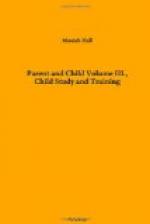1. Promptness and regularity.
2. Obedience to right and justice.
3. Truthfulness and honesty.
4. Thoroughness.
5. Industry or the habit of work.
6. Persistence.
7. Temperance.
8. Courtesy and respect for the rights of others.
Crowning these and transcending them in importance are the supreme sentiments and ideals of life, which cannot properly be regarded as habits; they are sympathy, love, faith, reverence for religious convictions, and the ideal of freedom or liberty.
Society itself could not endure but for the stability which habits afford. It is easy to denounce custom and tradition as obstacles to progress and reform, but it should be remembered that they are the social habits which society has acquired through registering the experience of the past, and that while some of them, such as intemperance and sexual vice, are destructive of society, others, like co-operation, and the ideal of freedom, are absolutely essential to human progress.
An example by Oppenheim, in his “Mental Growth and Control,” well illustrates the power of habit. A wealthy woman in New York City became interested in the crowded tenements of the east side; she believed that constant sickness, unclean habits, and the vicious characters of the people were due largely to overcrowding. She secured, therefore, some well furnished cottages in the suburbs and offered them rent free until such time as the occupants should become well established. Her surprise was great when they refused to move into these comparatively luxurious quarters; they seemed to prefer the dirt and disease, the sickness and vice to which they were accustomed. “She did not know the force of habit; she was totally ignorant of the hard and fast condition into which people grow. She had never stopped to consider how necessary it is for the world at large to have such repression. Without this control there could be no peace, no safety, no steady growth in civilized society. The poor would attack the rich, the lawless and violent would assail the peaceful, the indolent would refuse to labor, the regularity and studied discipline of well-ordered life would absolutely cease. In their place anarchy would reign and each day would make confusion worse confounded. Imagine, if you can, what animals would be if they lacked restraint of habit. Man’s power over them would cease instantly and their strength would be a terrible engine of destruction. Men would be as much worse as human intelligence exceeds brute intelligence. One is quite safe in declaring that habit is the great flywheel that regulates society.”
Desirable habits, therefore, together with all necessary reforms, must come about slowly; they should be the result of conscious training and education in all the factors that make for a higher civilization.




